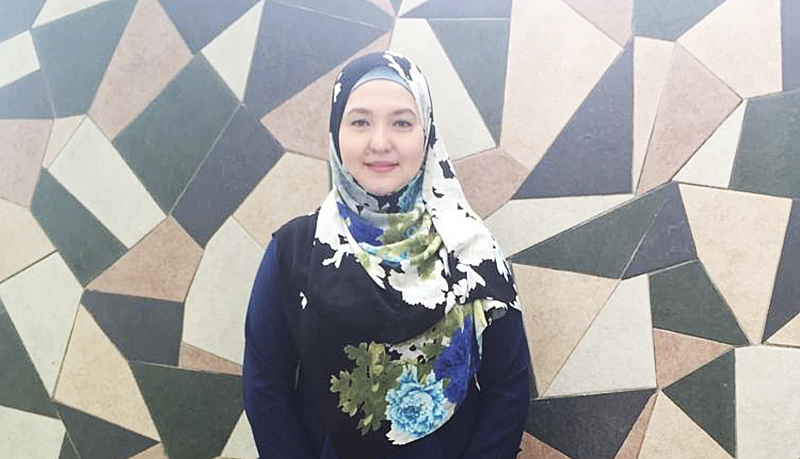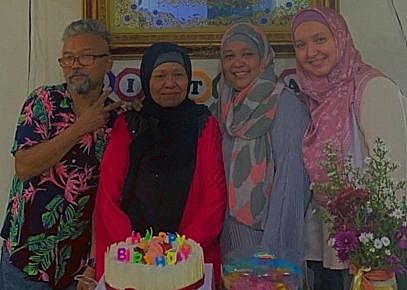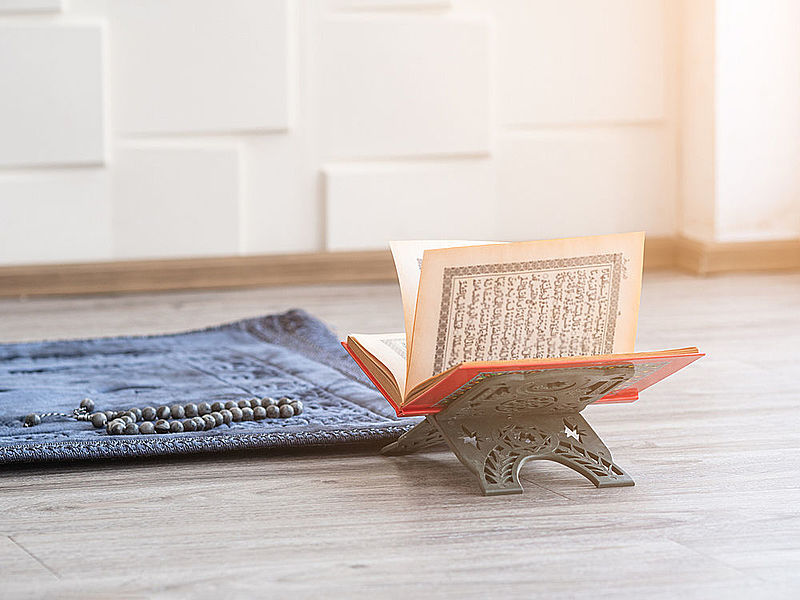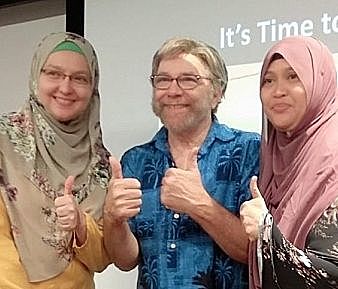Dealing with chronic depression inspires Singaporean woman to help others

When Rushsidah Abdullah was 28 years old, she was alone in the office when she suddenly started to feel terrified.
“I kept thinking and worrying a lot. I remember going home on a Friday, and I took the same bus and the same train, right? I lost my way; I lost my sense of direction. So I took longer to get home. That’s when I felt that something wasn’t right,” says the 46-year-old.
Although Rushsidah’s experience frightened her, she did not mention it to anyone. On Monday, she was back at work as if nothing happened.
However, life challenges and the stress of working long hours in the finance industry affected her mental health. Barely a year later, Rushsidah started to feel extremely anxious again.
“Just crossing the road – the same road I’ve crossed many times – I’m thinking a lot. What if the car knocks me down? What if I walk in that area and someone harms me? Suddenly, I have all these weird feelings. It was quite scary because I was all alone at that time.”
No one in Rushsidah’s family had ever faced such mental health issues, so they didn’t understand what she was going through. They asked her to do a lot of zikir but the symptoms kept coming back.
“They thought that maybe it’s some evil spirits. So they called a religious person to help to recite dua and see whether I’m fine, but he always mentioned, ‘She’s all right; there’s nothing wrong with her.’”
Read: What does Islam say about mental health?
Rushsidah’s condition worsened to the point that she was terrified of calling her boss to let her know that she was unwell. Her sister had to step in to call and let her know that Rushsidah could not go to work.
“My boss, the finance director of a clinical research company, asked my sister about my symptoms. When she heard how I was feeling, she suggested that I get a referral to see a psychiatrist.”
That was when Rushsidah was finally diagnosed with chronic depression. As she had not received professional help, she had to start going for counselling and taking medication immediately.

Rushsidah points out that it is possible to relapse even while taking medication. Thus, there are 3 things she cannot give up – family, religion and exercise.
Rushsidah can never forget the immense support from her family. When she was at her worst, she was not able to do day-to-day tasks such as showering or brushing her teeth. She would just sit on the sofa, deep in thought, and not respond to anyone. Her family took care of her, served food, and brought her to the toilet.
“It was like taking care of a baby. Even my late grandmother who was in her 80s then. She usually travelled using a wheelchair. When she knew that I was not well, she would climb up the stairs to the second floor where we live because we didn’t have a lift at that time. She would do that just to cook my favourite food, which is rendang. These are small things that I think I will always remember.”

Rushsidah finds peace in her religion.
“Islam helps me so much. You worry less and you know that no matter what, even if I don’t have anyone to speak to, I always have Allah to speak to. Life is so beautiful and you just need a little courage to get better. The illness is definitely very tortuous but one good thing I realise is that if I don’t have this illness, I wouldn’t realise how much I need Allah. Because of this illness, my relationship with Him is mended.”
Read these duas for depression and anxiety.

With her faith and support from her loved ones and mental health professionals, Rushsidah was able to stop her medication after 12 years. However, she has no qualms about resuming medication if she needs it.
While reading the newspaper, Rushsidah first discovered Club HEAL, a charity offering rehabilitation and counselling services to those suffering from mental illness. However, she did not have the courage to call them until her doctor suggested she get their services.
“When I was working in a corporate setting, I didn’t dare share my symptoms with anyone. But in Club HEAL, I get to meet people who are also suffering from mental illness. That’s where I learnt to be more confident to talk about my illness. ”
Things have come full circle. Now, Rushsidah is a peer support specialist at Club HEAL. She is trained to support those who struggle with mental health and uses her personal experiences to help with their recovery.

“Having coped with mental illness for more than fourteen years, I know that we need the whole village in order to recover. It’s really fulfilling to know that I could play a small part in helping others. I want to give back to the community, and I know that this career path will give me more blessings.”

Every day is an opportunity for Rushsidah to help others. She also learns a lot from the people she serves.
“It’s not just them learning from me. We get to exchange our coping skills and tips on how to manage our illness better. By sharing our recovery, we feel that we are not alone. Whenever I share, they will say, ‘That’s exactly what I feel.’ We always have that moment when we can connect. It’s really nice to be in this community.”
Rushsidah has met people who expressed relief that she is not married. “They say things like, ‘Oh, thank goodness! How are you going to be able to take care of your own child?’ Everyone deserves to have a normal life. I have colleagues who are also recovering, and they have four kids that they are raising.”
She hopes that the community will try to empathise with them and provide as much assistance as they can. Besides being good listeners, one of Rushsidah’s greatest wishes is that friends and family would encourage seeking professional help.
“For me, the longer you drag, the worse you may get. Depression is a medical condition that requires treatment and support. As my depression became chronic, I started to have symptoms of hallucinations and delusions. That was a very scary phase to go through. Only after seeing a doctor would you be able to know if you have a mental illness. Then you will be able to get proper treatment.”
What’s Rushsidah’s message to those who are going through mental health issues?
“You don’t have to suffer in silence. Talk to someone that you trust. It’s okay to ask for help.”
| If this article is beneficial to you, explore more of our mental health-related articles here :) |
If you need assistance with your mental health issues, do find out more about Club HEAL’s programmes on their website.
Pergas (Singapore Islamic Scholars and Religious Teachers Association) offers the Asatizah Solace Care to provide emotional and spiritual support service. Alternatively, you may also consider the following helplines and online resources:
- Institute of Mental Health’s Mental Health Helpline: 6389-2222 (24 hours)
- Samaritans of Singapore: 1800-221-4444 (24 hours) /1-767 (24 hours)
- Singapore Association for Mental Health: 1800-283-7019
- MindSG

